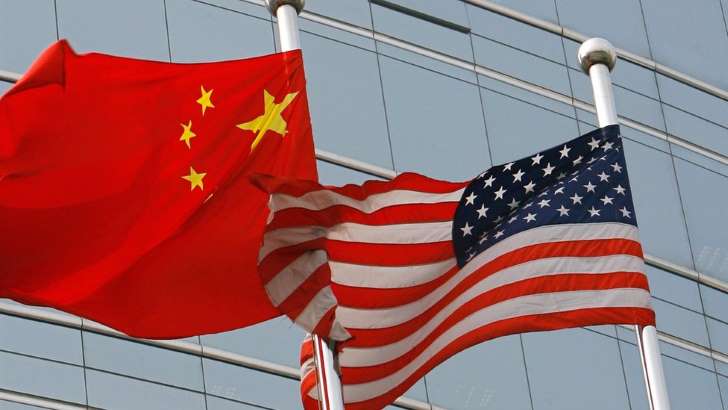Media Report

- The Associated Press reports: "China is sending its first senior official to visit the United States since President Donald Trump took office, amid uncertainties over trade relations and new security tensions in east Asia. The Foreign Ministry said State Councilor Yang Jiechi is scheduled to 'exchange views on bilateral ties and issues of mutual concern' in meetings with high-ranking U.S. officials during his visit on Monday and Tuesday. Yang is Chinese President Xi Jinping's top foreign policy adviser and a familiar face in Washington. He has served as foreign minister and ambassador to the U.S., presenting a degree of continuity in a relationship now seen as somewhat in flux. His visit comes as the future direction of relations between the world's two largest economies has grown more uncertain following Trump's accusation that China was cheating at trade and threats to raise import tariffs."
- Reuters reports: "The PLA Navy is likely to secure significant new funding in China's upcoming defense budget as Beijing seeks to check U.S. dominance of the high seas and step up its own projection of power around the globe. China's navy has been taking an increasingly prominent role in recent months, with a rising star admiral taking command, its first aircraft carrier sailing around self-ruled Taiwan and new Chinese warships popping up in far-flung places. Now, with President Donald Trump promising a U.S. shipbuilding spree and unnerving Beijing with his unpredictable approach on hot button issues including Taiwan and the South and East China Seas, China is pushing to narrow the gap with the U.S. Navy. 'It's opportunity in crisis,' said a Beijing-based Asian diplomat, of China's recent naval moves. 'China fears Trump will turn on them eventually as he's so unpredictable and it's getting ready.'...'It's power projection,' said a Beijing-based Western diplomat, of China's navy."
- Bloomberg View comments: "The deadliest outbreak of H7N9 bird flu since its discovery in 2013 is sweeping across China. It's caused at least 100 deaths and has been detected in half the country's provinces...In response, Chinese authorities have temporarily shut down live poultry markets in some of the country's biggest cities...But every year, so-called wet markets reopen and both new and known viruses reemerge. If authorities won't close such markets permanently -- and realistically, they can't, given how large a role the markets continue to play in China's food chain -- they need to do far more to fix what's wrong with them. The good news is, that should be relatively cheap and easy to do...wet markets need to be forced to modernize their own practices. It's an old tale: China's food-safety regulators lack the resources and are oftentimes uninterested in enforcing basic biosecurity and food-safety requirements in China's thousands of wet markets and millions of small farms. Temporary closures are useless if wet markets simply return to their unhygienic practices after reopening."
Calendar
- 2017-02-26 For More Chinese Firms, It Pays to Make It in the USA
- 2017-02-24 China hits back at Donald Trump's 'champion of currency manipulation' jibe
- 2017-02-23 As China Ups Heat on NKorea, US Faces Questions
- 2017-02-22 Exclusive: China finishing South China Sea buildings that could house missiles - U.S. officials
- 2017-02-21 Chinese premier appeals to Washington to avoid ‘trade war’
- 2017-02-20 Chinese Bank Cleanup Plan Could Leave a Mess
- 2017-02-19 US carrier starts 'routine' patrols in South China Sea
- 2017-02-17 Tillerson Urges China to Confront North Korean Provocations
- 2017-02-16 How Americans and Chinese view their countries and each other, in three charts
- 2017-02-15 Killing of Kim Jong Un’s Brother Intrigues North Korea’s Estranged Ally China
News
- The Associated Press 1st senior Chinese official visits Washington in Trump era
- Reuters Wary of Trump unpredictability, China ramps up naval abilities
- The Washington Post Counterfeiters, hackers cost US up to $600 billion a year
- The New York Times Taiwan Commemorates a Violent Nationalist Episode, 70 Years Later
- The Wall Street Journal Senate Poised to Confirm Wilbur Ross as Commerce Secretary
- Bloomberg China Said to Mull Curbs on Private Bonds Sold by Property Firms
- The Financial Times China bankruptcy cases surge as economy slows
- Reuters New Gambia government says committed to 'one China' policy
- Bloomberg China's Spat With Kim Jong Un Shows Difficulty Stopping Him
- The Wall Street Journal For More Chinese Firms, It Pays to Make It in the U.S.A.
- The Associated Press Asia economies hold trade pact talks after Trump dumps TPP
- The Financial Times South Korea's Lotte defies China over missile shield
- The Wall Street Journal China's Huawei Battles to Own the Next Generation of Wireless Technology
Commentary
- Bloomberg View How China Can Stop a Pandemic
- The Diplomat Is China Ready for Global Leadership?
- The National interest A U.S. Navy Fantasy: Bring Back the Big Battleships to Fight China?
- Barron's Alibaba: Why Goldman Sees 30% Upside
- Quartz China is making life hard for South Korea because of an antimissile system in over 40 petty ways
- TIME China Is Likely to Ramp Up its Naval Abilities In Response to Trump's Unpredictability
- Foreign Policy How to Persuade China to Squeeze North Korea's Lifeline
